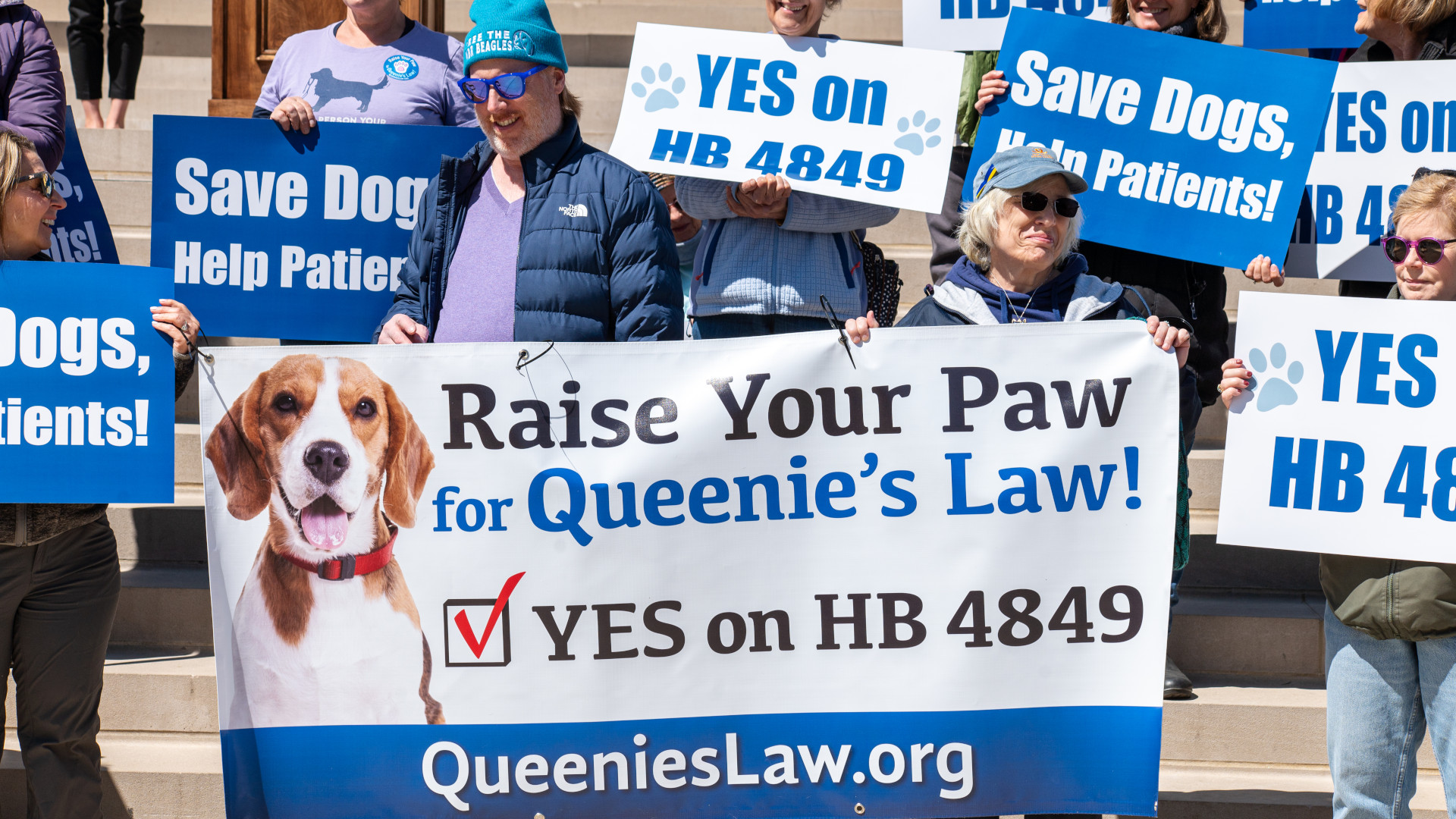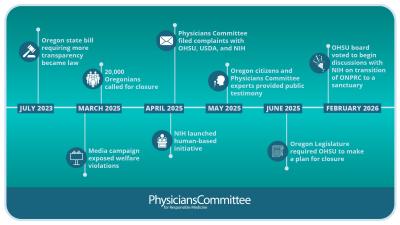Lily Tomlin, Dogs, Michigan Residents Ask Legislators to “Raise Your Paw for Queenie’s Law!”
Capitol Rally Focuses on HB 4849, Named After Dog Used in Deadly Wayne State Experiments

LANSING, Mich.—A large crowd and their canine companions covered the steps of the State Capitol Thursday morning for a rally in support of House Bill 4849, known as Queenie’s Law, which would outlaw painful dog experiments at public institutions in Michigan. Bill sponsor Rep. Matt Koleszar joined speakers from the national medical ethics group the Physicians Committee for Responsible Medicine and the Humane Society of Huron Valley, who called for a vote on the bill before the full House of Representatives. Also Thursday, Detroit native and former Wayne State student Lily Tomlin sent a letter to House Speaker Joe Tate stating, “I hope you will support House Bill 4849 and work to make it law.”
Attendees at Thursday’s rally held signs reading “YES on HB 4849” and “Save Dogs, Help Patients.” A banner 20 feet long strung above the Capitol’s entrance declared, “Raise Your Paw for Queenie’s Law!” In January, the House Agriculture Committee held a hearing on the bill for which Tomlin also submitted testimony.
The legislation was prompted by concerns about troubling heart failure experiments conducted since 1991 on dogs at Wayne State University. The Physicians Committee points to more than 10,000 pages of records it has obtained from Wayne State showing that the dogs experience painful disorders due to the invasive surgical procedures performed on them before they die or are killed. Newly released records also reveal that Wayne State has started feeding the dogs a “high fat diet” in order to “induce metabolic syndrome,” which can increase risk of strokes.
“Michigan’s public institutions, which conduct research in our name, should be held to higher standards,” said Rep. Koleszar. “This bill is a humane, scientifically sound way to raise those standards.”
Queenie’s Law would prohibit a “public body” from using dogs “in a manner that causes pain or distress.” It follows recent efforts in other states to increase oversight of animal experiments at a time of reduced regulation by federal agencies. Legal experts and animal advocates point out that the federal Animal Welfare Act does not prohibit painful experiments.
According to public records, Wayne State staff surgically open the chest cavities and sides of healthy dogs, implant medical devices and catheters in and around major arteries, and “tunnel” cables and wires under the animals’ skin and out through incisions between their shoulder blades. Many dogs die soon after the surgeries due to internal bleeding caused by implanted devices. And every dog who survives the initial surgeries will die during the experiment, in which a device triggers the animals’ hearts to beat at two to three times the normal rate while they run on treadmills. This is by design—Wayne State experimenters use the dogs until their bodies give out or a device breaks or malfunctions. Some dogs have been found dead in their cages.
“Dogs are suffering and dying, and Wayne State has nothing to show for it,” said Ryan Merkley, director of research advocacy for the Physicians Committee. “House leaders must hold a vote on Queenie’s Law.”
Since 1991, Wayne State has received $17 million in public funds for the experiments and related projects, which have been criticized by experts who conduct heart failure studies with human patients. In addition, population studies, cell-based methods, and the use of diseased hearts from patients undergoing transplants are producing useful information. The Texas Heart Institute, which is dedicated solely to addressing cardiovascular disease, stopped using dogs in studies in 2015.
To interview Ryan Merkley or to see pictures from the event or Lily Tomlin’s letter, please contact Reina Pohl at 202-527-7326 or rpohl [at] pcrm.org (rpohl[at]pcrm[dot]org).
Media Contact
Reina Pohl, MPH
202-527-7326
rpohl[at]pcrm.org
Founded in 1985, the Physicians Committee for Responsible Medicine is a nonprofit organization that promotes preventive medicine, conducts clinical research, and encourages higher standards for ethics and effectiveness in education and research.







